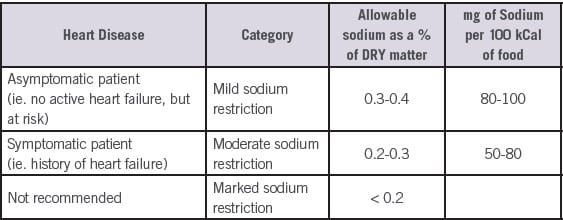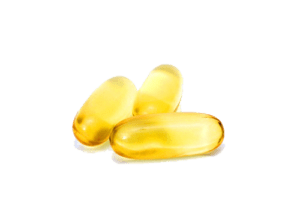Nutritional Supplements for Cardiac Patients
Nutrition for Cardiac Patients
- Diet in the cardiac patient can slow disease progression, minimize medication requirements, and in some cases, cure the underlying disease.
- Individualize the diet of your patient based on type and extent of heart disease, other health concerns, and what the patient will eat.
- Change diet gradually (over approximately one month) to avoid GI upset.
- When starting medications, avoid changes to the diet for the first two weeks and until the pet is eating well.
- Consultations with a veterinary nutritionist are available with the help of your primary care veterinarian at: http://vetnutrition.tufts.edu
SODIUM and DIETS
Salt (sodium chloride) restriction is important to decrease the retention of water and help control blood pressure.


For more information about sodium content of various foods and treats, please visit: http://vetmed.tufts.edu/heartsmart/diet.
OMEGA-3 FATTY ACIDS (FISH OILS)


- Dogs with heart failure have been shown to be deficient in omega-3 fatty acids.
- Commercial fish oil supplements vary widely in the amount of EPA and DHA they contain.
- A common formulation is a one gram capsule containing 180 mg EPA and 120 mg DHA. At this concentration, the recommended dose is one capsule per 10 lbs. of body weight.
- Avoid cod liver oil, flax, flaxseed oil, and products containing added vitamins A and D (vitamin E should be included as an antioxidant).
- Beneficial cardiovascular effects shown in humans and dogs:
- Improved energy metabolism in heart muscle cells
- Anti-inflammatory (heart failure is known to be an inflammatory disease)
- Reduced potential for arrhythmias and sudden death
- Combats weight loss related to advanced heart disease
L-CARNITINE
- L-carnitine is an essential amino acid responsible for the production of energy within the heart.
- Carnitine deficiency has been reported in humans and dogs with dilated cardiomyopathy.
- The L-form of carnitine must be used to be effective.
TAURINE
- Taurine is an amino acid found in high concentrations in the heart and is necessary for normal heart function.
- Dogs can develop taurine-deficient heart disease and may respond to supplementation.
- Some boutique, grain-free, or exotic ingredient diets have been shown to cause taurine deficiency; the FDA is investigating the specific problem with these diets.
COENZYME Q10 (Co-Q10)
- Co-Q10 is an antioxidant and supports energy metabolism.
- There are no veterinary studies to support or refute the use of Co-Q10 in dogs and cats.
OTHER SUPPLEMENTS
There are many nutritional supplements with claims of cardiovascular benefits. While some of these benefits may be true, these natural substances may interact with the medications prescribed by your veterinarian. Often these natural or herbal therapies have properties that may alter the blood pressure, heart rate, or fluid volume so please use them with caution after consultation with CVCA and your veterinarian.
